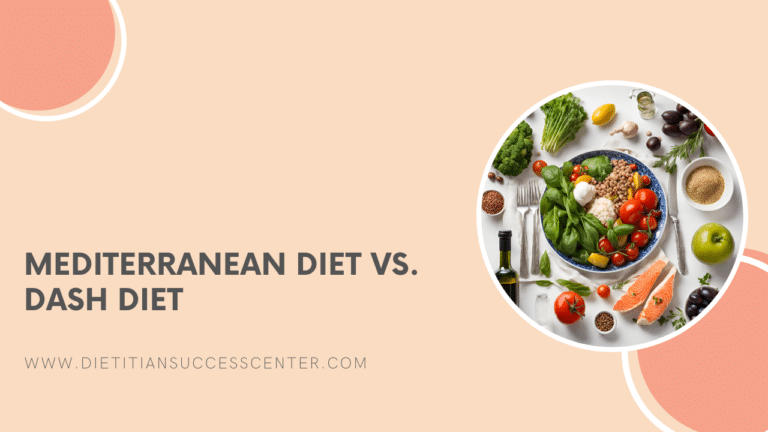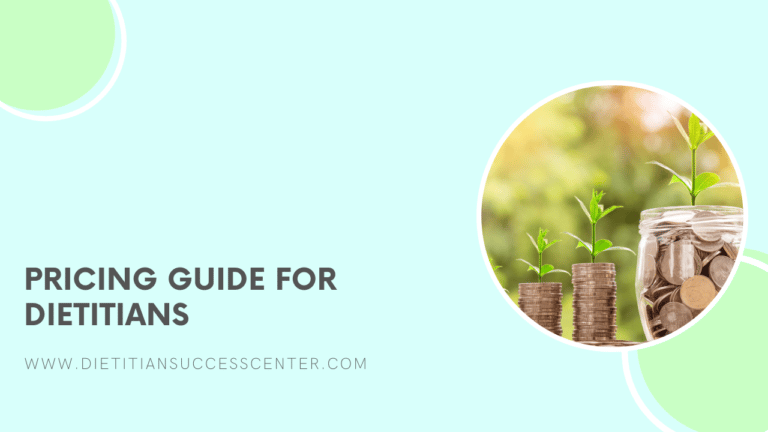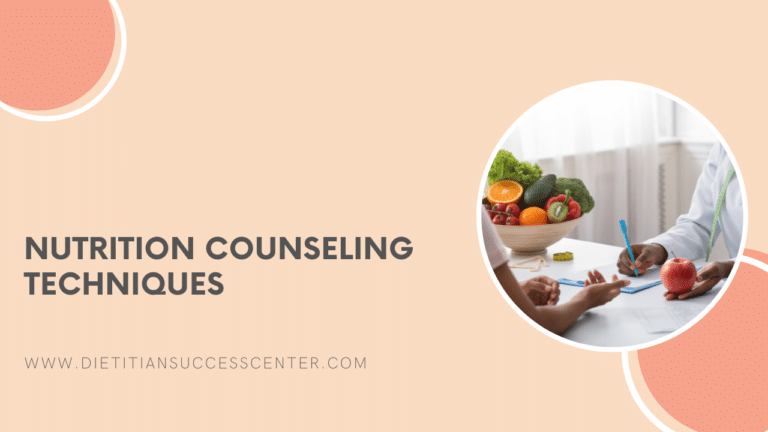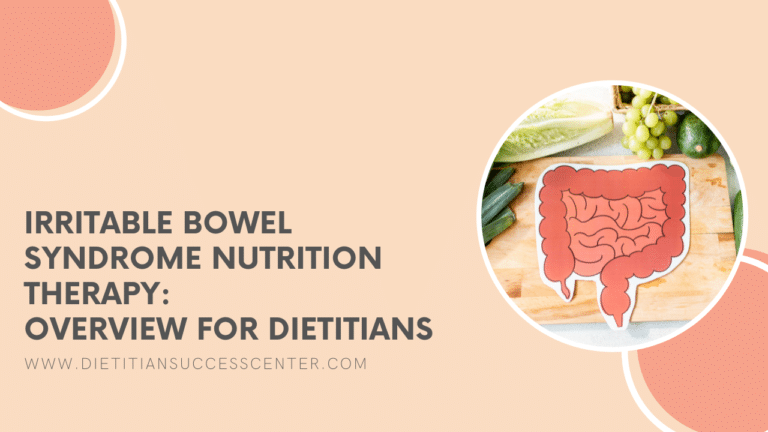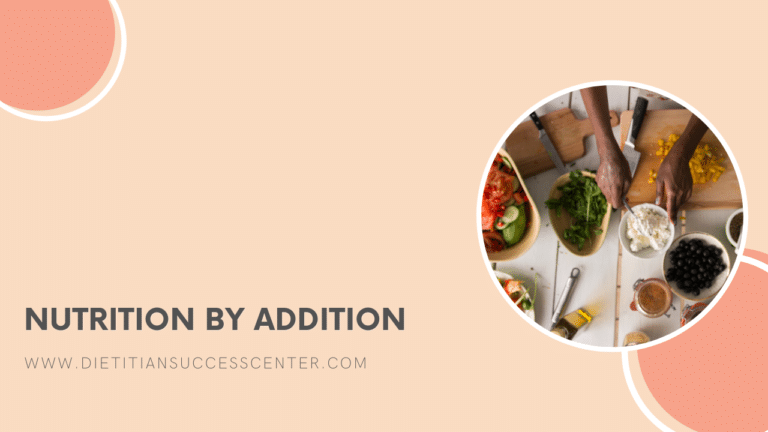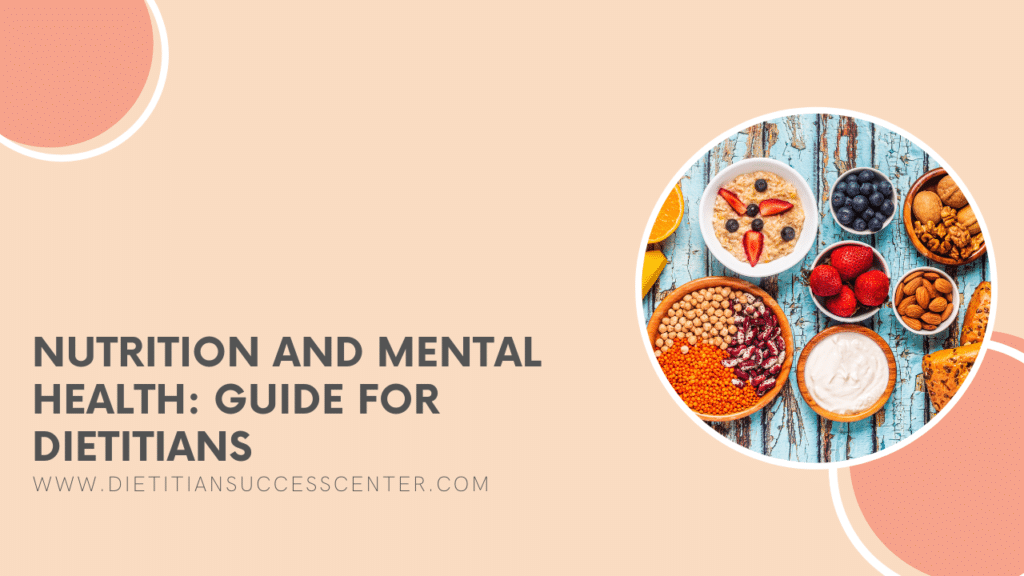

Written by Olivia Farrow, RD, MHSc
Reviewed by Krista Kolodziejzyk, RD, MPH, MBA
Update by Olivia Fournier, MAN(c), BASc (Dietetic Intern) (2024)
In this article, we discuss the importance of nutrition for overall health and mental well-being. We’ll explore the connections between gut health and mental health, and some key nutrients that play a role in mental health nutrition. Most importantly, we will discuss how to confidently support mental health as a dietitian.
Currently, nearly 1 billion people worldwide are living with mental illness (1). Nutrients and food can play a role in mood, well-being, and psychological function (2). It has been said that diet is as crucial to psychiatry as it is to endocrinology, gastroenterology, and cardiology (3).
What is Mental Health?
The World Health Organization defines mental health as “a state of mental well-being that enables people to cope with the stresses of life, realize their abilities, learn well and work well, and contribute to their community.” (5)
Mental health is not only characterized by the absence of an illness. Mental health is a spectrum, and can be high, low, or moderate, regardless if a mental illness is present (6).
Some determinants of mental health include:
- Social determinants: stressful work environment, lifestyle, exclusion socially or based on gender
- Psychological determinants: one’s brain chemistry and personality traits
- Biological: including genetics and chemical imbalances in the brain
In practice, this may be presented as (2):
- Clients with diagnosed mental conditions, such as anxiety and depression, are thriving in their mental well-being.
- Clients without diagnosed mental illness but low mental health quality.

Food and the Brain
Consuming enough energy and the right nutrients is important for the brain to function properly.
About 80% of brain structure is made of fats (7). Fatty acids from the diet are important for the integrity and function of the brain. Essential fatty acids cannot be built by the body, and need to be consumed to be used by the brain.
The rest of the brain is made up of protein, carbohydrates, water, and salts, which are also things that we get from the diet (8). In the body, the brain consumes around 20% of our total energy (9). These nutrients are required to support normal brain and central nervous system development (7).
DSC’s nutrition and mental health course, included in your Dietitian Success Center membership, summarizes evidence-based interventions for nutrition and mental health including an overview of the brain structure, must-know neurotransmitters, and the connections between food and the brain.
Gut-Brain Connection
Each human has a unique microbiome.
The microbiome is the unique set of microbes and their genetic components on and inside the human body (8).
Many factors make up the microbiome, including:
- Birth
- Early nutrition and development
- Diet
- Health status
- Environment
The brain and the gut contain neurons, which are cells responsible for telling your body how to behave. 100 billion are located in the brain and 100 million in the gut (7). The gut is sometimes referred to as the second brain because of how many neurons are located in it.
Evidence continues to support how important gut health is to overall health, including mental health, and its influence on other areas of the body outside the gut.
Supporting Gut Health
How can we support our client’s gut health to in turn, improve brain health? (2,10)
- Fiber: Eating a variety of high-fiber foods, including both soluble and insoluble fiber help to support a healthy gut.
- Prebiotics: Fibers that feed your gut bacteria when ingested are fermented by those bacteria.
- Probiotics: Improve your healthy gut bacteria, and may be beneficial for improving brain health. Probiotics have been found to affect the brain by potentially improving stress levels, anxiety, and depression symptoms
- Fermented Foods: A source of probiotics in the diet.
These foods can also provide anti-inflammatory effects, further supporting gut health and mental health (7).
Key Nutrients in Mental Health Nutrition
Some other important nutrients play a key role in mental health nutrition including (7,11):
- B Vitamins
- Vitamin D
- Omega-3
- Iron
- Selenium
- Magnesium
- Zinc
- Potassium
- Choline
- Antioxidants
Common nutrient deficiencies may be found in individuals with mental illness, including deficiencies of (10):
- B vitamins
- Vitamin D
- Minerals, especially magnesium
- Omega-3 fatty acids
- Amino acids from proteins that are important for the synthesis of key neurotransmitters for mental health
These nutrients, their role in mental health, and supplement indications are covered in depth in our nutrition and mental health course, included in your DSC membership.
Supporting Mental Health as a Dietitian
A Non-Diet/Weight Neutral Approach
When working with clients to support their mental health, applying a non-diet approach is very important. There are known benefits to a non-diet approach in improving patterns of disordered eating, self-confidence, and depression (11). Weight-focused interventions can do more harm emotionally, psychologically, and physically.
The non-diet approach emphasizes three main pillars (12):
- Self-acceptance
- Weight inclusivity
- Intuitive eating
A non-diet approach is associated with lower rates of depression and disordered eating and enhanced self-esteem and body image when compared to restrictive or weight-loss-focused diets (12).
Practicing positive dietary changes (“nutrition by addition”), such as mindful eating, and regularity in timing meals can be more effective when working to optimize mental health.
Mindful Eating
Mindful eating is a useful approach when working in mental health dietetics (13). Mindful eating means focusing on eating as an experience with a direct focus on the act of eating.
Your DSC membership includes ready-to-use handouts and a client-facing mindful eating handout pdf.
Summary
Nutrition plays a key role in supporting mental health. Registered dietitians can support clients with diagnosed mental illness to manage the nutrition-related side effects of medications and foster improved self-management, to support overall mental health. Nutritional interventions such as improving gut health, reducing inflammation, and correcting deficiencies can help to support a healthy brain.
At DSC, we make it easier for dietitians and dietetic students to build expertise in topics including mental health. Our nutrition and mental health course, ready-to-use client handouts, and community can help you feel more confident.
Dietitian Success Center is THE professional development resource for dietitians and dietetic students. Our mission is to make it easier for dietitians and dietetic students to build expertise. We do this through evidence-based online nutrition courses, community, and ready-to-use client handouts. Plus – we give you the tools to start and grow your dietitian private practice!
Disclaimer: the information provided in all written materials is for educational purposes only and is not to be used as medical advice or to diagnose or treat a medical disease. It is strictly for informational purposes and is general in nature. Dietitian Success Center Inc. is not responsible and cannot be held liable for any actions or inactions taken related to the information produced. Consult with your local medical provider before implementing any dietary changes. It is hereby understood that the information provided does not replace medical advice provided by your healthcare provider.
References
- WHO Mental Health Report. World mental health report: transforming mental health for all. Geneva: World Health Organization; 2022. Available from: https://iris.who.int/bitstream/handle/10665/356119/9789240049338-eng.pdf
- Firth, Joseph et al. “Food and mood: how do diet and nutrition affect mental wellbeing?.” BMJ (Clinical research ed.) vol. 369 m2382. 29 Jun. 2020, doi:10.1136/bmj.m2382
- Sarris, Jerome et al. “Nutritional medicine as mainstream in psychiatry.” The Lancet. Psychiatry vol. 2,3 (2015): 271-4. doi:10.1016/S2215-0366(14)00051-0
- Li, Ye et al. “Dietary patterns and depression risk: A meta-analysis.” Psychiatry research, vol. 253 (2017): 373-382. doi:10.1016/j.psychres.2017.04.020
- “Mental Health,” World Health Organization, Accessed July 02, 2021, https://www.who.int/health-topics/mental-health#tab=tab_1.
- Keyes’ dual-continua model of mental health. Figure from “Promoting and protecting positive mental health: Early and often throughout the lifespan,” by C. L. M. Keyes in C. L. M. Keyes (Ed.), Mental well-being: International contributions to the study of positive mental health (p. 17), 2013, Springer Netherlands. Copyright 2013 by C. L. M. Keyes
- Raymond, J., Morrow, K. “Medical Nutrition Therapy in Psychiatric and Cognitive Disorders”. (2023). In Krause and Mahan’s Food & The Nutrition Care Process: 16th Edition. Pages 945-973. Elsevier, Inc
- Clapp, Megan et al. “Gut microbiota’s effect on mental health: The gut-brain axis.” Clinics and practice vol. 7,4 987. September 15, 2017, doi:10.4081/cp.2017.987
- Padamsey, Zahid, and Nathalie L Rochefort. “Paying the brain’s energy bill.” Current opinion in neurobiology vol. 78 (2023): 102668. doi:10.1016/j.conb.2022.102668
- Kim, Chong-Su et al. “Probiotic Supplementation Improves Cognitive Function and Mood with Changes in Gut Microbiota in Community-Dwelling Older Adults: A Randomized, Double-Blind, Placebo-Controlled, Multicenter Trial.” The journals of gerontology. Series A, Biological sciences and medical sciences vol. 76,1 (2021): 32-40. doi:10.1093/gerona/glaa090
- Harvard College. “Antioxidants” The Nutrition Source. (n.d.). Available from https://www.hsph.harvard.edu/nutritionsource/antioxidants/
- Clifford, Dawn et al. “Impact of non-diet approaches on attitudes, behaviors, and health outcomes: a systematic review.” Journal of nutrition education and behavior vol. 47,2 (2015): 143-55.e1. doi:10.1016/j.jneb.2014.12.002
- Davison KM, Ng E, Chandrasekera U, Seely C, Cairns J, Mailhot-Hall L, Sengmueller E, Jaques M, Palmer J, GrantMoore J for Dietitians of Canada. Promoting Mental Health through Healthy Eating and Nutritional Care: Executive Summary. Toronto: Dietitians of Canada, 2012. Access at: https://www.dietitians.ca/DietitiansOfCanada/media/Documents/Resources/Exec-Summary-DC_Mental_Health_Nutrition_Eng.pdf


